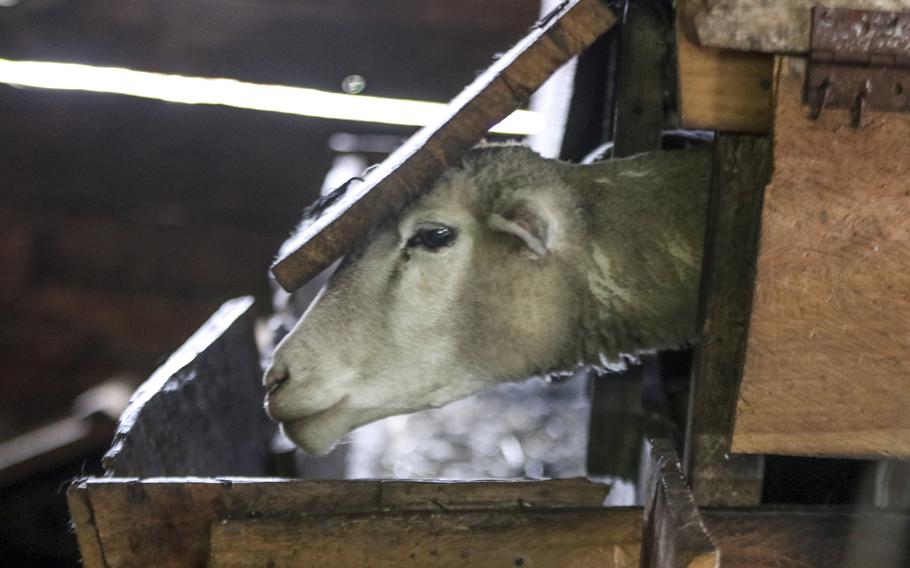
A sheep sticks his head out of a corral in Guatemala in 2019. People for the Ethical Treatment of Animals claimed a small victory Wednesday, Feb. 1, 2023, after learning the Navy ended years of what the group called “crude” medical testing on sheep at the University of Wisconsin-Madison. (Ryan Matson/U.S. Army)
WASHINGTON — People for the Ethical Treatment of Animals claimed a small victory Wednesday after learning the Navy ended years of what the group called “crude” medical testing on sheep at the University of Wisconsin-Madison.
PETA said the Navy paid for two testing programs at the campus, which involved subjecting sheep to high-pressure environments to learn more about decompression sickness in humans, commonly known as “the bends.”
“That sheep will no longer have the life literally squeezed out of them in crude and archaic decompression tests at UW-Madison is cause for celebration,” PETA Vice President Shalin Gala said.
PETA called the end of the testing on sheep “a victory” and encouraged the Navy to go further and bar all similar animal testing at all Navy-funded research locations.
“We urge the Navy to fully ban the conducting and funding of all decompression sickness and oxygen toxicity experiments using any animal at any institutions, given the extreme cruelty of these tests and their irrelevance to human physiology,” Maggie Wisniewska, science policy adviser at PETA, wrote in a letter Wednesday to Navy Secretary Carlos Del Toro.
Decompression sickness is caused by nitrogen gas bubbles that form in the bloodstream and organs as the human body rapidly goes from a high-pressure environment, such as underwater, to a normal-pressure environment. The bends is often seen in divers who rise to the surface too quickly and can be deadly if not treated quickly.
PETA only recently discovered the testing programs ended after receiving records from UW-Madison through a Freedom of Information Act request. The Navy confirmed Wednesday that the decompression sickness testing with sheep at UW-Madison ended in July.
“The contract for the project came to its natural conclusion at the end of the performance period,” a Navy spokesperson said, adding the testing was done to determine whether emergency procedures would “safely and successfully allow submariners trapped in a disabled submarine on the sea floor to escape or be rescued.”
“The safety and health of our sailors and Marines is the Navy's highest priority,” the service spokesperson said.
However, a PETA spokesperson said the testing programs were authorized to continue until August 2023 and June 2024.
PETA sent letters to Del Toro and Defense Secretary Lloyd Austin last year asking for the tests to be halted. In its campaign, the group specified several instances in which sheep were subjected to unpleasant experiments. Having undergone repeated stressful tests, the sheep were often left with a variety of maladies, including “crippling” joint pain, seizures, paralysis and deep chest pain, and in at least one case, a sheep had to be euthanized during the test when the compressing chamber malfunctioned, PETA said.
The group argued the tests are harmful and painful for the sheep and offer little value because the results don’t translate well to humans. Further, the group said there are better non-animal test methods that provide better results.
This is not the first time that PETA campaigned against sheep being used in research testing at UW-Madison. In 2010, the group successfully helped to stop similar experiments. At the time, PETA called for a criminal investigation because it said the tests violated Wisconsin law. However, state lawmakers later changed that animal cruelty law to exempt research scientists and the Navy authorized testing to resume a few years later.
Animal testing in the military has long been a concern for advocates such as PETA. Last September, the group sent a letter to Army Secretary Christine Wormuth asking that the service revive a ban on “wounding experiments” involving animals. In those tests, researchers use weapons to wound dogs, cats, marine animals and some primates to see how their bodies react and heal.
Wounding experiments were banned at the U.S. Army Medical Research and Development Command in the 1980s, but PETA said the service reversed the ban in 2020 and has not been forthcoming about whether it’s actively conducting those types of experiments again.
“Taxpayers deserve to know what the U.S. Army is hiding by refusing to release details on its shocking weapon wounding experiments on animals,” Wisniewska wrote in her letter to Wormuth, referring to the Army declining a Freedom of Information Act request for records on the tests. The service said the records are classified “in the interest of national defense or foreign policy.”
The Army did not respond Wednesday for a request for comment about experiments on animals.